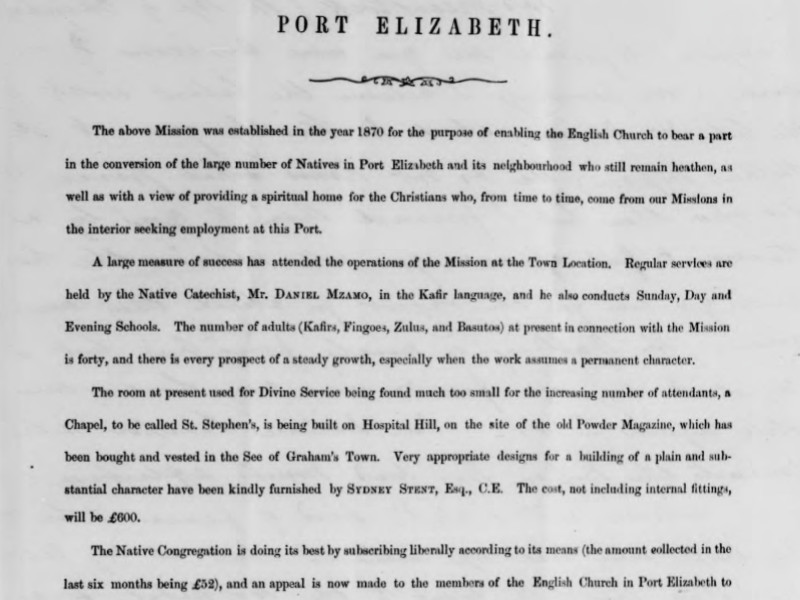South Africa in Records from Colonial Missionaries, 1819–1900

South Africa through the eyes of Anglican missionaries, 1819–1900
When the heathen people found out that I was trying to do more for God, they began to despise me, and many of them tried to drive me away from their place. I nearly gave up the Evangelist work altogether.the first indigenous Anglican minister in Zululand.
Access the full collection
Access the full archive of South Africa in Records from Colonial Missionaries, 1819–1900.
Institutional Free Trial
Start your free trialRegister for a free 30-day trial of South Africa in Records from Colonial Missionaries, 1819–1900, for your institution.
Institutional Sales
Visit Sales PagesellFor more information on institutional access, visit our sales page.
Single User License
Purchase a license below to view the full collection.
Already have a license? Sign in.
Explore interactions between Christian missionaries and indigenous people in South Africa

South Africa in Records from Colonial Missionaries, 1819–1900 was curated in association with the Bodleian Library.
This collection contains records compiled by the United Society Partners in Gospel (USPG), a UK-based Anglican missionary organisation that operates globally. From the eighteenth to the early twentieth century, the USPG went by the name of the Society for the Propagation of the Gospel in Foreign Parts (SPG).
This collection contains letters and supplementary material relating to SPG missionaries who worked in South Africa during the period 1819–1900. These documents contain a wealth of information regarding the progress of the mission, financial concerns, and movements of people. The sources in this collection likewise detail the number of people who attended Anglican services. The papers provide students and researchers with unique insights into the evolution of the SPG. They also shed light on the broader diffusion of Christianity throughout South Africa.
Contents
South Africa in Records from Colonial Missionaries, 1819–1900...
South Africa through the eyes of Anglican missionaries, 1819–1900
Discover
Highlights

Licensed to access Capetown, C/AFS/1
This document includes letters written by Fearon Fellows. Born in Cumbria in 1788, Fellows was educated at St. John’s College, Cambridge, and was subsequently ordained within the Church of England. In 1820, the British admiralty appointed him astronomer for the Cape of Good Hope. Fellows was responsible for the construction of the first astronomical observatory in the southern hemisphere.

Licensed to access Natal, D. 42
This document includes letters written by William Macrorie. Macrorie was appointed bishop of Maritzburg by the (then) bishop of Cape Town, Robert Gray. Thus, Macrorie was the first colonial Anglican bishop who was not appointed by a British monarch. The British government disapproved of the appointment and refused to grant the queen's mandate for Macrorie's consecration.

Licensed to access Zululand, D. 1899
This document contains correspondence from Titus Mtembu, the first indigenous Anglican minister in Zululand. His correspondence provides key insights into the attitudes towards Christian missionaries that prevailed throughout Zululand. The document also illustrates how indigenous people were either apathetic towards, or actively resisted, Mtembu’s religious instruction.
Insights
The SPG records relating to Cape Town focus on the movements of people and money. They also cast light on how missionaries were viewed by local communities. Naturally, missionaries sought to convince people to attend church. These documents reveal exactly how many people did.
The records in this collection cover the period 1819–1900 and relate to Cape Town, Grahamstown, Natal, Zululand, and Kaffraria.
The SPG papers for Zululand reveal some of the challenges faced by Christian missionaries in South Africa, not least the fact that, typically, local chiefs were either wary of or resisted missionary activity. Indeed, there are countless examples throughout this collection of resistance to missionaries. Some of them resorted to distributing food so as to incentivise engagement with their activities and teachings.
Papers covering Natal and Grahamstown provide information regarding the movements of missionaries between dioceses and regarding their financial concerns. The papers also supply details of the progress made by SPG missionaries in these areas.
Unlock Historical Research for Your Institution
Provide your students and researchers with direct access to unique primary sources.




.svg)



